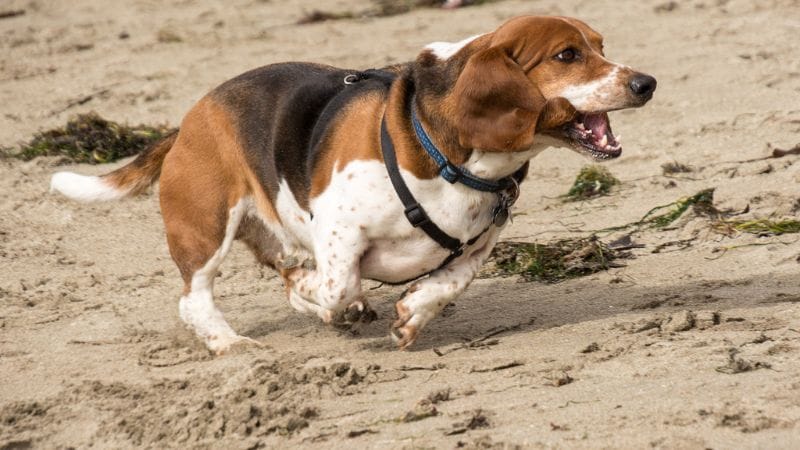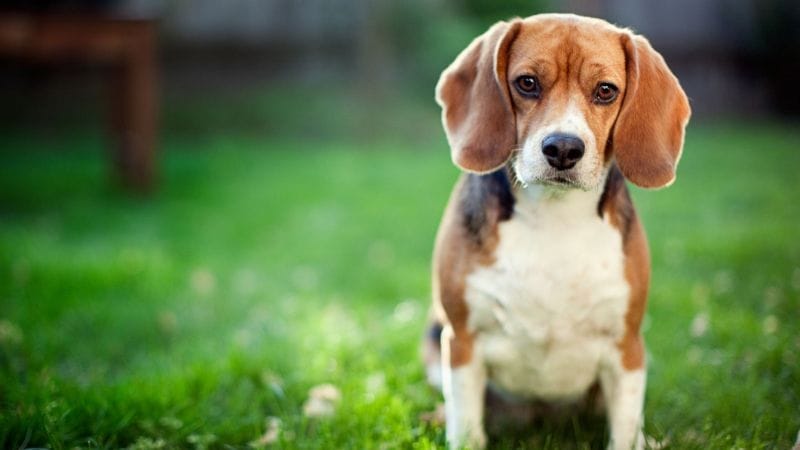Hound dogs are known for their excellent sense of smell. However, this trait can sometimes lead to an unpleasant odor commonly referred to as "hound dog smell." This distinct odor can be caused by a variety of factors, including the dog's breed, diet, hygiene, and environment.

Understanding Hound Dog Smell Hound dog smell is a unique odor that can be difficult to describe but is often described as a musky, earthy smell. It is most commonly associated with breeds such as Bloodhounds, Beagles, and Basset Hounds, but can also be present in other breeds. The smell is caused by a combination of factors, including the dog's skin, coat, and the oils it produces, as well as the bacteria and yeast that can grow on the skin.
Grooming and Hygiene Regular grooming and hygiene practices can help reduce hound dog smell. This includes brushing the coat regularly to remove loose hair and dirt, bathing the dog with a mild shampoo, and cleaning the ears and teeth. It is also important to keep the dog's bedding and living area clean and well-ventilated.
Key Takeaways
- Hound dog smell is a distinct odor caused by a combination of factors, including the dog's breed, diet, hygiene, and environment.
- Regular grooming and hygiene practices can help reduce hound dog smell.
- Understanding the factors that contribute to hound dog smell can help dog owners keep their pets smelling fresh and clean.

Understanding Hound Dog Smell
Hound dogs are known for their distinctive odor, which can be off-putting to some people. Understanding the sources of hound dog smell can help owners manage and reduce the odor.
Sources of Odor in Hounds
Hound dog smell comes from a variety of sources, including natural oils, sebum, bacteria, and yeast. Hounds have a unique odor because they produce more oil than other breeds, which can lead to a stronger smell.
In addition to natural oils, hounds have scent glands that produce a musky odor. These glands are located in the anal area and release a scent when the dog defecates. The scent can also be released when the dog is scared or excited.
The Role of Glands and Skin Health
Hound dog smell can also be influenced by the health of the dog's skin. When a dog's skin is healthy, it produces natural oils that help protect the skin and keep it moisturized. However, when the skin is dry or irritated, it can produce more oil, which can lead to a stronger odor.
Regular grooming can help reduce hound dog smell by removing excess oil and dirt from the skin and coat. This can also help prevent skin infections and other skin problems that can contribute to odor.
In summary, hound dog smell is a result of natural oils, scent glands, and skin health. By understanding these sources of odor, owners can take steps to manage and reduce hound dog smell. Regular grooming, including bathing and brushing, can help keep hounds smelling fresh and clean.
Grooming and Hygiene
Keeping a hound dog smelling fresh and clean can be a challenge, but with regular grooming and hygiene practices, it can be achieved. In this section, we will discuss some techniques for keeping your hound dog clean and smelling good.
Bathing Techniques
When it comes to bathing a hound dog, there are a few things to keep in mind. First, hound dogs have sensitive skin, so it is important to use a shampoo that is gentle and moisturizing. Look for shampoos that contain ingredients like oatmeal or aloe vera, which can help soothe and moisturize the skin.
It is also important to avoid getting water in the dog's ears, as this can lead to infections. To prevent this, you can use cotton balls to gently plug the ears while bathing. Additionally, hound dogs tend to have long ears, so it is important to be gentle when washing them to avoid tangling or matting.
Brushing and Coat Care
Regular grooming is important for hound dogs, as it helps to remove loose hair and dirt, and can also help distribute natural oils throughout the coat. Brushing should be done at least once a week, using a soft-bristled brush or a grooming mitt. This can help prevent matting and tangling, and can also help reduce shedding.
In addition to brushing, it is important to keep the coat clean and free of debris. Hound dogs tend to have oily skin, which can lead to a strong odor. To combat this, you can use an odor-neutralizing spray or wipe to freshen up the coat between baths.
Professional Grooming Services
If you are unable to keep up with regular grooming at home, or if your hound dog requires more specialized care, you may want to consider professional grooming services. A professional groomer can help keep your dog's coat clean and healthy, and can also provide services like nail trimming and ear cleaning.
When choosing a professional groomer, look for someone who has experience working with hound dogs and who uses gentle, pet-friendly products. Some groomers may also offer services like chlorhexidine baths, which can help reduce odor and bacteria on the skin.
By following these grooming and hygiene practices, you can help keep your hound dog smelling fresh and clean, and can also promote overall health and well-being.
Diet and Health
Nutritional Considerations
A hound dog's diet plays a crucial role in his overall health and well-being. It is essential to provide a nutritious diet that meets all the dietary requirements of the dog. A balanced diet should include proteins, carbohydrates, fats, vitamins, and minerals. Hound dogs require a high protein diet as they are active breeds that require a lot of energy.
It is recommended to consult with a veterinarian to determine the best diet for your hound dog. The veterinarian can recommend a specific dog food brand that meets all the dietary requirements of your dog. It is important to avoid feeding your hound dog table scraps or human food as they can cause digestive problems and lead to obesity.
Exercise and Overall Health
Hound dogs are active breeds that require regular exercise to maintain their overall health. Exercise helps to keep the dog's muscles and joints healthy, improves cardiovascular health, and helps to maintain a healthy weight. It is recommended to take your hound dog for regular walks or runs to ensure that he gets enough exercise.

Regular exercise also helps to reduce stress and anxiety in dogs. Hound dogs can be prone to separation anxiety, and regular exercise can help to reduce their anxiety levels. It is important to ensure that your hound dog gets enough exercise to maintain his overall health and well-being.
In addition to a nutritious diet and regular exercise, it is also important to maintain good dental hygiene in hound dogs. Regular brushing and dental cleanings can help to prevent infections and keep your hound dog's teeth and gums healthy. By following these guidelines, you can help to ensure that your hound dog remains healthy and happy for years to come.
Home Environment
Cleaning and Maintenance
Maintaining a clean home environment is crucial when it comes to controlling hound dog smell. Regular cleaning and maintenance of furniture, carpets, and floors can help eliminate any unwanted odors. It is recommended to vacuum carpets and furniture at least once a week and to mop floors regularly. Additionally, it is important to wash any dog bedding and toys on a regular basis.
Odor Control Solutions
There are several odor control solutions that can be used to help manage hound dog smell in the home. Baking soda is a popular and effective solution for neutralizing odors. Sprinkling baking soda on carpets or furniture and allowing it to sit for a few hours before vacuuming can help eliminate any unwanted smells. Another solution is the use of air purifiers. Air purifiers can help remove any airborne particles that may be contributing to the smell. Additionally, vinegar can be used to help eliminate odors. Mixing equal parts water and vinegar in a spray bottle and spraying it on furniture or carpets can help neutralize any unwanted smells.
Overall, maintaining a clean home environment and utilizing odor control solutions can help manage hound dog smell in the home.
Common Challenges and Solutions
Dealing with Persistent Odors
One of the most common challenges faced by dog owners is dealing with persistent odors caused by their hound dogs. These odors can be smelly and unpleasant, making it difficult to spend time with your furry friend. To eliminate these dog odors, it is important to identify the source of the problem.
One common cause of persistent odors is water that has been left on the dog's fur. This can happen when the dog is not dried properly after a bath or swim. To eliminate this problem, it is important to thoroughly dry the dog after any water activity. Use a towel or a blow dryer to make sure that the fur is completely dry.
Another cause of persistent odors is dirt and debris that has accumulated on the dog's fur. Regular grooming can help prevent this problem. Brushing the dog's fur and giving them a bath every few weeks can help keep them clean and eliminate any unpleasant smells.
Preventive Measures
Preventive measures can also be taken to eliminate hound dog smell. One solution is to use a deodorizing spray designed specifically for dogs. These sprays can help eliminate any odors and leave your dog smelling fresh and clean.
Another preventive measure is to wash your dog's bedding regularly. This can help eliminate any dog odors that may be lingering in their sleeping area. It is also important to clean the areas where your dog spends most of their time, such as their crate or playpen. Regular cleaning can help prevent any unpleasant smells from developing.
In conclusion, dealing with hound dog smell can be a challenge, but there are solutions available. By identifying the source of the problem and taking preventive measures, you can eliminate any persistent odors and enjoy spending time with your furry friend.
Breed-Specific Considerations
Short vs. Oily Coats
When it comes to hound dog breeds, there are two distinct types of coats: short and oily. Short-coated breeds like the Basset Hound and Bloodhound require less grooming than their oily-coated counterparts, such as the Coonhound. However, oily-coated hounds have unique needs that must be addressed.
Oily coats require more frequent baths and grooming to prevent skin issues and odors. It is important to use a gentle shampoo specifically formulated for dogs to avoid stripping their natural oils. Additionally, regular brushing can help distribute the oils throughout the coat and prevent matting.
Scent Hounds' Unique Needs
Scent hounds, like all hound breeds, have a keen sense of smell and are often used for hunting. This means they may be exposed to various scents and odors that can cling to their coats, resulting in a distinct hound dog smell.

To combat this, scent hounds may require more frequent baths and grooming than other breeds. Additionally, it is important to keep their living areas clean and well-ventilated to prevent odors from building up. Regular exercise and outdoor playtime can also help keep their coats and skin healthy.
Overall, hound breeds require regular grooming and care to maintain their health and prevent odors. It is important to consult with a veterinarian or kennel club for breed-specific recommendations and to ensure proper care for your furry friend.
Understanding Canine Olfactory System
Dogs have a remarkable sense of smell that allows them to detect scents that humans cannot. Their olfactory system is highly developed, with a nose that is capable of detecting even the faintest of odors. This section will explore how dogs perceive their own smell and the impact of odor on their behavior.
How Dogs Perceive Their Own Smell
Dogs have a keen sense of smell that allows them to recognize their own scent. They have scent glands located throughout their body, which produce a unique odor that is specific to each individual dog. Dogs use their sense of smell to communicate with each other, and they can identify other dogs by their scent.
The vomeronasal organ, also known as the Jacobson's organ, is an important part of a dog's olfactory system. It is located in the roof of the dog's mouth and is responsible for detecting pheromones. Pheromones are chemical signals that are released by animals and can influence the behavior of other animals of the same species.
Impact of Odor on Dog Behavior
Odor can have a significant impact on a dog's behavior. Dogs are attracted to certain scents, such as the scent of food or the scent of another dog. They use their sense of smell to locate food and to track prey.
Body odor can also have an impact on a dog's behavior. Dogs are sensitive to the scent of their owners and can become anxious or stressed if they detect a change in their owner's scent. This is why it is important for owners to maintain good hygiene and to avoid using strong perfumes or colognes around their dogs.
In conclusion, the canine olfactory system is a powerful tool that allows dogs to navigate their environment and communicate with each other. Understanding how dogs perceive their own smell and the impact of odor on their behavior can help owners better understand their pets and provide a more comfortable and stress-free environment for them.

Frequently Asked Questions (FAQs)
- What causes hound dogs to have a distinctive odor?
- Hound dogs have a distinctive odor due to the presence of oil-producing glands in their skin. These glands produce a strong-smelling oil that helps hounds track scents. Additionally, hounds have a keen sense of smell, which means they often sniff around and roll in things that can contribute to their odor.
- Are there effective methods for reducing the scent of hound breeds?
- Regular bathing and grooming can help reduce the scent of hound breeds. Additionally, using specialized shampoos and sprays designed to neutralize odors can be effective. It's important to note that hounds should not be over-bathed as this can strip their skin of natural oils and cause skin irritation.
- Which dog breeds are known for having the least odor?
- Some dog breeds that are known for having the least odor include poodles, bichon frises, and shih tzus. These breeds have hair instead of fur, which means they shed less and produce less dander, which can contribute to odor.
- Why do some hound dogs emit a musty smell?
- Some hound dogs emit a musty smell due to the presence of yeast or bacteria on their skin. This can be caused by a variety of factors, including allergies, poor diet, or a weakened immune system. Regular grooming and veterinary care can help prevent and treat this issue.
- How does the smelling ability of a hound compare to other breeds?
- Hounds have an exceptional sense of smell compared to other dog breeds. They have up to 300 million scent receptors in their noses, which is 50 times more than humans. This makes them well-suited for tracking scents and hunting.
- What are the differences in odor levels among various hound breeds?
- There can be differences in odor levels among various hound breeds. For example, bloodhounds are known for having a particularly strong odor due to their large size and the amount of oil-producing glands in their skin. However, with proper grooming and care, all hound breeds can be kept relatively odor-free.






